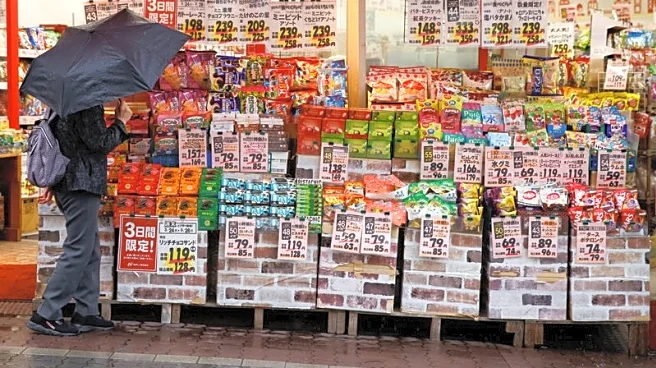By Makiko Yamazaki
TOKYO (Reuters) - Japan's core inflation slowed for a second straight month in July but stayed above the central bank's 2% target, keeping alive market expectations for another interest
rate hike in the coming months.
The nationwide core consumer price index (CPI), which excludes fresh food items, rose 3.1% in July from a year earlier, government data showed on Friday, faster than a median market forecast for a 3.0% gain.
The rise was smaller than the 3.3% increase in June, due largely to the base effect of last year's rise in energy prices, which came from the termination of government subsidies to curb fuel bills.
A separate index that strips away both fresh food and fuel costs - closely watched by the BOJ as a measure of domestic demand-driven prices - rose 3.4% in July from a year earlier after increasing by the same rate in June.
Rising food and raw material costs have kept Japan's core inflation above the Bank of Japan's 2% target for well over three years, causing some BOJ policymakers to worry about second-round price effects.
The BOJ last year exited a decade-long, massive stimulus and raised short-term interest rates to 0.5% in January on the view Japan was close to durably hitting its 2% inflation target.
While the bank revised up its inflation forecasts last month, Governor Kazuo Ueda has stressed the need to tread cautiously on further rate hikes, due to an expected hit to the economy from U.S. tariffs.
The Japanese economy has been showing resilience even though sweeping U.S. tariffs are dragging down exports.
Last week's unexpectedly strong second-quarter gross domestic product data, combined with a U.S.-Japan trade deal struck last month, has fuelled market expectations that a tariff-driven recession will be averted - bolstering the case for another rate hike later this year.
Some analysts also point to Washington's pressure for more rate hikes, following rare and explicit comments from U.S. Treasury Secretary Scott Bessent who said the BOJ was "behind the curve" on policy.
The latest Reuters poll showed 63% of economists surveyed this month expect the central bank to raise base borrowing costs to at least 0.75% from 0.50% by the end of this year, an increase from 54% in last month's poll.
(Reporting by Makiko Yamazaki; Editing by Sam Holmes and Lincoln Feast.)









